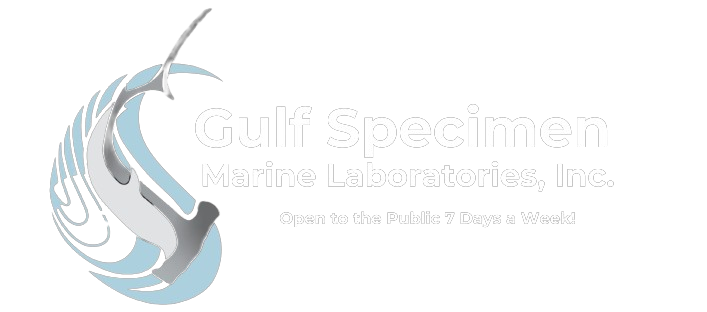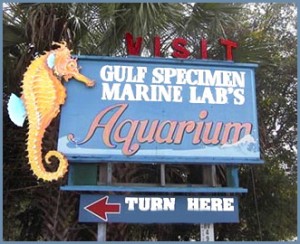Gulf Specimen Marine Lab “Through The Years”
What We Do Here
Established in 1963, Gulf Specimen Marine Laboratory is an independent, nonprofit 501(c)3 organization that provides marine life to schools and research laboratories. We also study endangered species and conduct research in mariculture, farming the edge of the sea. Today we are an integral part of numerous research programs all over the United States, Canada and Europe.
In 1995, due to continued strong growth in interest and attendance, GSML began a program to more strongly emphasize educational programs for regional schools, aquarium display and public visitation. (Read more about our history here.)
Our sea urchins and sponges have been sent to outer space and have been studied using some of the most sophisticated technology our society has to offer. Yet as modern day “hunter gatherers” we employ many of the simple harvesting techniques that Indians, who subsisted on this bountiful Panhandle coast, used thousands of years ago.
We strive to keep from damaging the fragile marine habitats, and actively oppose pollution and careless coastal development so that the sea will continue to bring forth. Please help us protect the earth which grows such strange and beautiful creatures. Support the preservation and protection of natural area and avoid over consumptive habits.
An Interactive Nature Center
Giving people an appreciation for the diversity of life in the sea and a desire to protect it is Gulf Specimen’s primary mission. We do so by using our touch tanks, graphic exhibits and conducting field trips to provide a unique “hands-on” experience enabling students to touch, smell, and hear the odd and interesting creatures of the Gulf of Mexico, and develop an awareness and desire to protect the fragile life in the sea. To help maintain this facility, we supply schools and research laboratories with a wide variety of living marine life from the Gulf of Mexico. That service is essential to researchers all over the United States in many different fields of science, hence we have won state, national and international awards for our efforts.
While most aquariums feature large charismatic marine mammals and sharks, Gulf Specimen focuses on the fascinating world of the small. More than a hundred school groups and over 20,000 individuals visit our laboratory each year to view hundreds of species of local invertebrates, fish and algae as well as sharks and sea turtles from the Gulf of Mexico.
Our exhibits are never the same twice. The marine biological supply operation that supports the laboratory provides a constant flow of animals coming through the lab. A wide variety of invertebrates, fishes and algae are routinely collected by local fishermen and shipped to schools and research laboratories, hence no aquarium or standard marine laboratory with static exhibits can compete with it. At any given time, between one and two hundred species are present. Visitors are allowed to pick up and touch many of the animals, including starfish, sea pansies, sand dollars, whelks, clams, etc.
Whether pre-schoolers, high school, college students or casual visitors, all ask the same fundamental questions: “What is it? Where does it live? What does it eat? What eats it, and how does it reproduce?”
While visitors are touching and seeing, we use the opportunity to tell them of the problems facing Florida’s ecosystems and how they can protect it. In addition to working with children and rehabilitating wounded or sick sea turtles, we work closely with biomedical institutions studying the ocean’s vast storehouse for sources of potential new pharmaceuticals and have become an integral part of numerous research programs all over the United States, Canada and Europe.
After a visit to our lab, instead of stepping over or on much of the life when they’re on the beach, people will notice. No longer will they stare puzzled at the “blob on the beach”. They will understand the diversity of life in the sea and perhaps have a desire to protect it.
Mission Statement
Gulf Specimen Marine Laboratory’s mission is to further through study, research, publication, teaching and public display the knowledge of marine biology; to promote protection of marine life and the marine environment; to collect, classify and disseminate marine biological specimens.
Contact us
Gulf Specimen Marine Laboratories, Inc.
P.O. Box 237
222 Clark Drive
Panacea, Florida, 32346 Phone:(850)984-5297
E-mail: gspecimen@sprintmail.com
Facebook: https://www.facebook.com/GulfSpecimenAquarium
Twitter: @gulfspecimen1 Instagram:#gulfspecimen
Gulf Specimen on Wikipedia


